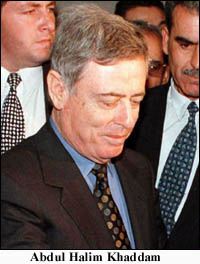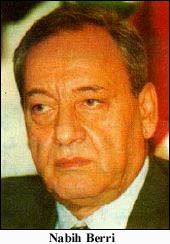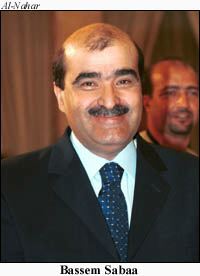 |
| Vol. 3 No. 6 | Table of Contents MEIB Main Page | June 2001 |
 |
On the other side of the ravine, a loose coalition of political elites have maneuvered, either overtly or covertly, to oppose Lahoud's power play. Druze leader Walid Jumblatt was among the first to square off against the security establishment. Tensions between Lahoud and Prime Minister Rafiq Hariri, who controls the economic and financial instruments of power, have been boiling over for months. Parliament Speaker Nabih Berri, the third member of Lebanon's governing troika, has begun aligning himself squarely in the Hariri camp in recent weeks.
In reaction to the chaotic political climate prevailing in Beirut, Syrian President Bashar Assad, who took control of the "Lebanon file" from Vice President Abdul Halim Khaddam during the course of his political apprenticeship in 1998, appears to have partially given it back in a bid to quell the polarization of the Lebanese regime. Khaddam visited Beirut earlier this month and met with the regime's top political figures in an effort to broker a truce. Whether Damascus can reformulate a stable Pax Syriana among Lebanon's political elites remains to be seen.
Background
During the late 1990's, as Bashar Assad consolidated his authority within the Syrian regime through the appointment of loyal allies in the military and security services, a similar process occurred in Lebanon. In 1998, the young Syrian heir apparent engineered the ouster of Hariri and Jumblatt, both of whom had strong ties to the "old guard" in Damascus, from the Lebanese government while installing Gen. Emile Lahoud as president. Unsure of his ability to navigate the complex web of Lebanese politics (an art that Khaddam had mastered), Assad sought to strengthen the position of President Lahoud vis à vis competing Lebanese political elites and make him the new point man for Syrian control over the country. Toward this end, he chose the lackluster Selim al-Hoss to replace the dynamic and unpredictable Hariri as prime minister.
More importantly, senior military and security positions within the new regime were handed to figures of unquestioned loyalty to Syria. Gen. Michel Suleiman, who is related by marriage to the official spokesman of the late Hafez Assad, was appointed commander of the Lebanese army. Other newly-appointed members of the Lebanese security establishment, such as Brig. Gen. Jamil al-Sayyid, the head of General Security Directorate, also had long-standing ties with the Assad family.
Over the next two years, however, public perceptions of Lahoud and Hoss plummeted as the country descended into economic recession. In the fall of 2000, the Syrians began rebuilding their bridges with Hariri in advance of the 2000 parliamentary elections. After Hariri and his political allies triumphed at the polls, the billionaire tycoon was again appointed prime minister. Political tensions between Hariri and Lahoud gradually escalated in the months that followed.
Hariri vs. Lahoud
The current political struggle between Hariri and Lahoud is rooted in the 1989 Taif Accord, which deprived the Lebanese presidency, traditionally reserved for Maronite Christians of virtually all political power. According to the terms of this accord, which laid the foundations for Lebanon's Second Republic, each area in which the Lebanese president can hypothetically exercise power, such as designating the prime minister or dismissing ministers, is subject to the approval of other institutions.1
However, since Damascus has completely controlled the Second Lebanese Republic, the actual power of the Lebanese president vis à vis the Suuni Muslim prime minister and Shi'ite speaker of parliament has become an arbitrary reflection of relations between the particular personalities occupying these offices and the Syrian regime. Lahoud's predecessor, Elias Hrawi, had been relegated to the position of "least among equals" in the governing troika. Lahoud has been elevated to the position of "first among equals" in the governing troika.
Security-related ministries in the new government were placed under the direct or indirect control of loyal allies of Syria who are answerable to Lahoud. The Interior Ministry is headed by Lahoud's son-in-law, Elias Murr. Defense Minister Khalil Hrawi has long-standing ties to Maj. Gen. Ghazi Kanaan, the head of Syrian military intelligence in Lebanon. As previously mentioned, all of security organs of the state have extremely close ties to Damascus.
Hariri, while being given considerable freedom in the formulation of economic policy, has been completely excluded from security policy. Naturally, Hariri (along with most Lebanese Sunnis) resents both the overwhelming power that the Syrians have imparted to Lahoud and the impact that Lahoud's control of security has had on his economic recovery program. For Syria, the continuation of tensions in south Lebanon is of critical importance, so Lahoud has refused to order the army to deploy in strength along the border. Damascus brokered an alliance between Hezbollah and Lahoud to ensure that it stays this way.
Over the last several months, Hariri increasingly began to challenge Lahoud and the Syrians on the issue of south Lebanon. Hariri was understandably perturbed on February 16, when a Hezbollah attack killed an Israeli soldier in the disputed Shebaa Farms area. Just one day earlier, he had confidently assured a group of investors in Paris that there would be no more outbreaks of violence in south Lebanon. "We have a clear agreement with our Syrian brothers in this matter," he said, "There will be no provocations on our part."2
Hariri reached his boiling point when Hezbollah launched another deadly attack on April 14. The next day, his newspaper, Al-Mustaqbal, openly questioned whether Lebanon can "bear the consequences of such an operation and its political, economic and social impacts."3
The Syrians were outraged by the editorial, particularly after Israel launched a retaliatory air strike that destroyed a Syrian radar station in the mountainous Dahr al-Baidar region of central Lebanon. Assad reportedly accused Hariri of having inspired the Israeli attack and angrily canceled a scheduled meeting with the Lebanese premier in Damascus. For the next month, Assad refused to receive him, while openly welcoming former Prime Minister Omar Karami to the Syrian capital (sparking rampant speculation in the Lebanese media that Hariri would be replaced). Pro-Syrian ministers in the Lebanese cabinet openly criticized Hariri to his face.
During his visit to the United States later that month, Hariri attempted to thwart Lahoud and the Syrians by excluding the Lebanese ambassador in Washington, Farid Abboud, from his meetings with US officials. Lahoud, who has close ties with Abboud, was outraged and Damascus sent word to Hariri that the ambassador was to be included in all discussions with the Americans.
Berri Aligns with Hariri
 |
Berri also allowed his political allies to publicly berate the security services. Ali Khreiss, a senior leader of Berri's Amal movement, openly accused Brig. Gen. Sayyed of jamming Berri's Liberation Day speech on the state-run media. In addition, Berri himself alleged that government decrees were being held for months "in the drawers of the security apparatus" to prevent their implementation.
According to informed sources, Berri's growing opposition to Lahoud stems from several factors. First, Lahoud's increasingly close alliance with Hezbollah, brokered by Syria to ensure the continuation of attacks against Israeli forces in the Shebaa Farms area, is seen by Berri as a threat to his leadership of the Shi'ite Muslim community. Second, ministers loyal to Lahoud have obstructed Berri's efforts to promote a government development program in south Lebanon as a means of competing with Hezbollah, which has used Iranian funding to provide social services in the area. Third, Berri's attempts last fall to broker a reconciliation between Syria and the Maronite Church were thwarted by Lahoud, who sees himself as the sole interlocutor between Syria and the Christian community.
 |
Berri jumped in and demanded that Hariri order an investigation. Hariri pointed out that only the prime minister is authorized to order a phone tapping and told the assembly, "I assert that to this day I did not give such permission." He then added that "no one is above the law," a conspicuous reference to a pledge made by Lahoud in his 1998 inaugural speech. "I want a clear answer from you," responded Berri, " . . . I want to know whether you will ask the prosecutor-general's office to step in, or if you have any other approach."4 Berri's reaction was virtually unprecedented, as he has usually relied upon his parliamentary allies to attack the security services. Dozens of MP's also weighed in on the issue, in some cases criticizing Hariri for permitting the security services to operate outside of his control. "If you're aware and are deliberately ignoring it because you don't have the means to face it, this would be a catastrophe," said Zghorta MP Nayla Mouawad.
Interestingly (though hardly surprising given the nature of politics in Lebanon), Jumblatt largely stayed out of the fray, having recently met with Lahoud and been invited to Damascus for the first time since last year.
Sabaa's accusations were widely seen as having been instigated by Hariri. "Sabaa, who is a solid member of Hariri's bloc in Parliament, would not have said what he said without Hariri's consent," wrote Al-Nahar editor Gibran Tueni the next day. He added that Sabaa's bombshell was a scandal that "would have toppled the government and the entire regime in other countries."5 The English-language Daily Star proclaimed that "the security agencies' close ties to the executive branch of government, especially with the former army commander ensconced [in the presidential palace] at Baabda, will not shield them from a full and fair inquiry into Sabaa's charges."6
Lahoud, who was in France at the time, was outraged and refused to take telephone calls from either Hariri or Berri. He also refused to cosign a decree from Berri authorizing an extraordinary session of parliament to resume the budget debate which had been abruptly suspended after Sabaa's accusations.
Enter Khaddam
On June 4, Khaddam arrived in Beirut and immediately began cracking heads together. The Syrian vice-president first met privately with Hariri at the premier's mansion in Koraitem, then with Berri at his residence in Ain al-Tineh. After lunch, Khaddam and Maj. Gen. Kanaan brought both of the wayward politicians to the presidential palace and held a four hour discussion with all three members of the troika.
A relaxation of tensions was soon evident. A cabinet session on June 7 proceeded smoothly, with controversial topics such as phone tapping and the Lebanese University merger clearly being put on hold for the time being. Khaddam also convinced the three members of the troika to travel in the same plane for their trip to Qordaha, Syria on June 10 to mark the first anniversary of the death of Syrian President Hafez Assad (each of the three had originally planned to travel separately along with their political allies). However, the three were said to have barely spoken during the flight.
Meanwhile, in an obvious bid to appease Jumblatt and ensure that he does not add fuel to the fire, Syrian Defense Minister Mustafa Tlass apologized to the Druze leader for telling the Beirut daily Al-Diyar last month that Syria had "invented" him, claiming it was a "misquote."7
The coup de grace came on June 13, when Damascus began a limited redployment of troops from Beirut and its suburbs [see Under Duress, Syria Pulls Troops out of Beirut in this issue of MEIB], an initiative intended to bolster political support for Lahoud and appease his critics.
Conclusion
It is unlikely, however, that Damascus will be able to unify the ranks within the Lebanese regime over the long term. Syrian patronage is not the political trump card that it used to be. With no end to the economic crisis in sight, a growing number of Lebanese political elites will disassociate themselves from Lahoud and pander to public opinion by condemning the security forces, questioning the "resistance" in south Lebanon, and calling for "rectification" of ties with Syria. At the same time, the Hariri-Berri alignment against Lahoud is not likely to evolve into a lasting alliance. Berri, as well as many other political elites, has a great deal at stake in the corrupt system that Hariri has said must be reformed. Lebanese politics will, as always, remain chaotic and shifting.
Notes
1 See Joseph Maila, The Document of National Understanding: A Commentary (Oxford: Center for Lebanese Studies, 1992), p. 41.
2 Quoted in Nicholas Blanford, "Hizbullah Hoist by Its Own Petard," The Middle East, April 2001.
3 Al-Mustaqbal (Beirut), 15 April 2001.
4 Al-Nahar (Beirut), 1 June 2001, The Daily Star (Beirut), 1 June 2001.
5 Al-Nahar (Beirut), 1 June 2001.
6 The Daily Star (Beirut), 1 June 2001.
7 Al-Nahar (Beirut), 9 June 2001, Al-Diyar (Beirut), 11 May 2001.